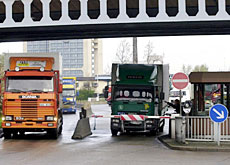
Switzerland and EU resolve re-export tax row

The European Union has confirmed it will not carry out a threat to impose new tariffs on re-exports from Switzerland to member states.
The news comes as a relief for Swiss businesses, which feared a re-export tax would cost the economy billions of francs and put thousands of jobs at risk.
The Swiss economics ministry said a deal was struck on Wednesday between Jean-Daniel Gerber, the state secretary for economic affairs, and Robert Verrue, the EU’s director-general for taxation and duties.
The two negotiators agreed to abide by an existing trade agreement dating back to 1972, under which products and materials imported to Switzerland and subsequently exported back to the EU are not subject to customs charges.
Sigh of relief
The decision was widely welcomed by the Swiss business community.
“This is a very positive development for us, even though the decision did not come as a surprise,” said Dorothea Tiefenauer of the Swiss mechanical and electrical engineering industry association, Swissmem.
The Swiss Society of Chemical Industries (SSCI) said the tax would have had a negative impact on trade with France and Germany.
“The very close ties with Germany and France in the Basel area would have suffered a great deal,” said Pietro Fontana of SSCI.
In an earlier interview with swissinfo, senior Swiss trade official Luzius Wasescha warned that a tax on re-exports could cost the chemical industry as much as SFr2 billion ($1.62 billion) a year.
Breathing space
A row over the proposed tax on re-exports from Switzerland broke out at the start of the year when the EU unveiled plans to levy the charge – without officially communicating its decision to the Swiss government.
Switzerland won some breathing space at the end of February after Brussels agreed to delay the introduction of the tax for a period of three months.
EU officials argued that the 1972 accord did not apply to re-exports. Switzerland responded that its textile, chemical and pharmaceutical industries, which rely on raw materials from EU member states, would be badly hit by the tax.
Both the EU and Switzerland rejected speculation that the tax threat was designed to increase pressure on Bern to sign a second set of bilateral treaties with Brussels.
swissinfo with agencies
82% of Switzerland’s imports come from the EU and are worth SFr123 billion ($95.4 billion).
60% of Swiss exports are to the EU, half of which go to Germany.
Re-exports are goods and materials imported from the EU to Switzerland and subsequently exported back to the EU.

In compliance with the JTI standards
More: SWI swissinfo.ch certified by the Journalism Trust Initiative


























You can find an overview of ongoing debates with our journalists here . Please join us!
If you want to start a conversation about a topic raised in this article or want to report factual errors, email us at english@swissinfo.ch.